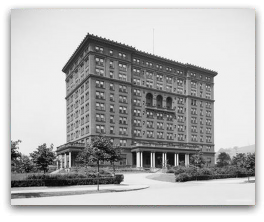Main menu
- ‘Abdu’l-Bahá’s Journey
- World Peace
- Stopping Racism in America
- Empowerment of Women
- More Principles...
- Prayer for America
Mahmud May 7 — Pittsburgh: "West must learn divine civilization from the East …"

Early in the morning ‘Abdu’l-Bahá received newspapers giving news of His arrival, His addresses and the meetings of the Bahá’ís, and describing the respect shown to Him, each report having a photograph of Him taken with us.
Shortly afterwards He received a letter from a dignitary of the city, who stated that after reading the newspapers and reflecting on the teachings of the Cause, he was convinced of its truth and greatness and wished to submit to ‘Abdu’l-Bahá a statement of his conviction and recognition of the Faith.
We left Cleveland at 8:00 a.m., arriving in Pittsburgh around noon. The friends in Pittsburgh, who had been informed by telegram of ‘Abdu’l-Bahá’s arrival, were waiting at the station. When the train pulled in, they were overjoyed to see Him and followed Him to the Hotel Schenley where He was staying.
After an hour’s brief rest, ‘Abdu’l-Bahá received many people who had been invited by the friends to meet Him. Some were leaders of the Jewish community who invited Him to address their congregations. However, owing to a previous commitment at the Peace Congress in New York City, He was not able to accept their invitation.
There was a large meeting in the evening at the hotel for the friends in Pittsburgh. ‘Abdu’l-Bahá spoke on the teachings of Bahá’u’lláh, His address ending with these words: ‘The East must acquire material civilization from the West and the West must learn divine civilization from the East.’ Everyone expressed their appreciation of the teachings with the utmost sincerity.
A little later a group of philosophers, doctors and journalists met with ‘Abdu’l-Bahá. He spoke to them in detail about composition and decomposition and the diagnosis of disease:
If one is fully cognizant of the reason for the incursion of disease and can determine the balance of elements, he can cure diseases by administering the food that can restore the normal level of the deficient element. In this way there will be no need for medicines and other difficulties will not arise.
After a detailed discussion of this subject, He asked them, ‘Although animals do not know the science of medicine, why, when they are sick, do they abstain instinctively from what is injurious to them and eat foods that are beneficial, while man, when ailing, inclines more to that which is injurious to him?’ They had no answer to this question and stated that the Master knew the answer better than they.
‘Abdu’l-Bahá then gave a description of the extraordinary power of the world of humanity and the freedom of man from the limitations of nature:
Since man’s attention is not confined to one interest, his negligence is greater; while his comprehension is greater than that of all other creatures when it is focused and fixed on one subject.








